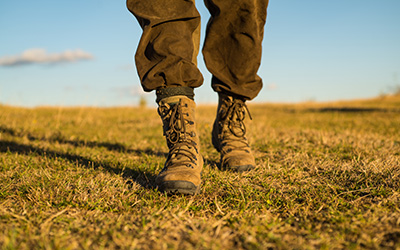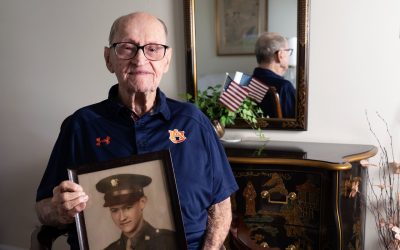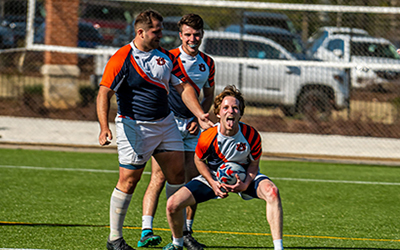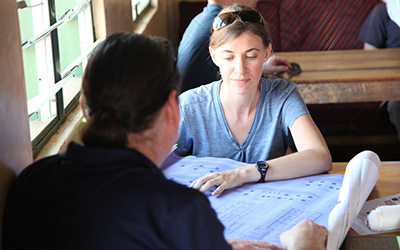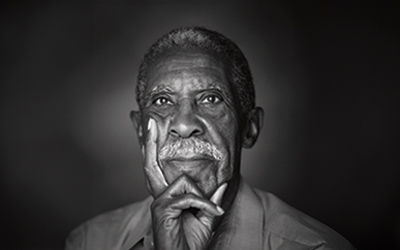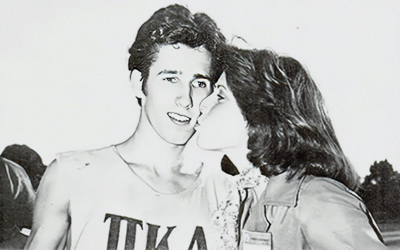Life isn’t easy in the military, but transitioning out can be even harder. Curtis Pippin ’17 helps veterans adjust to civilian life one connection at a time.
By Derek Herscovici ’14
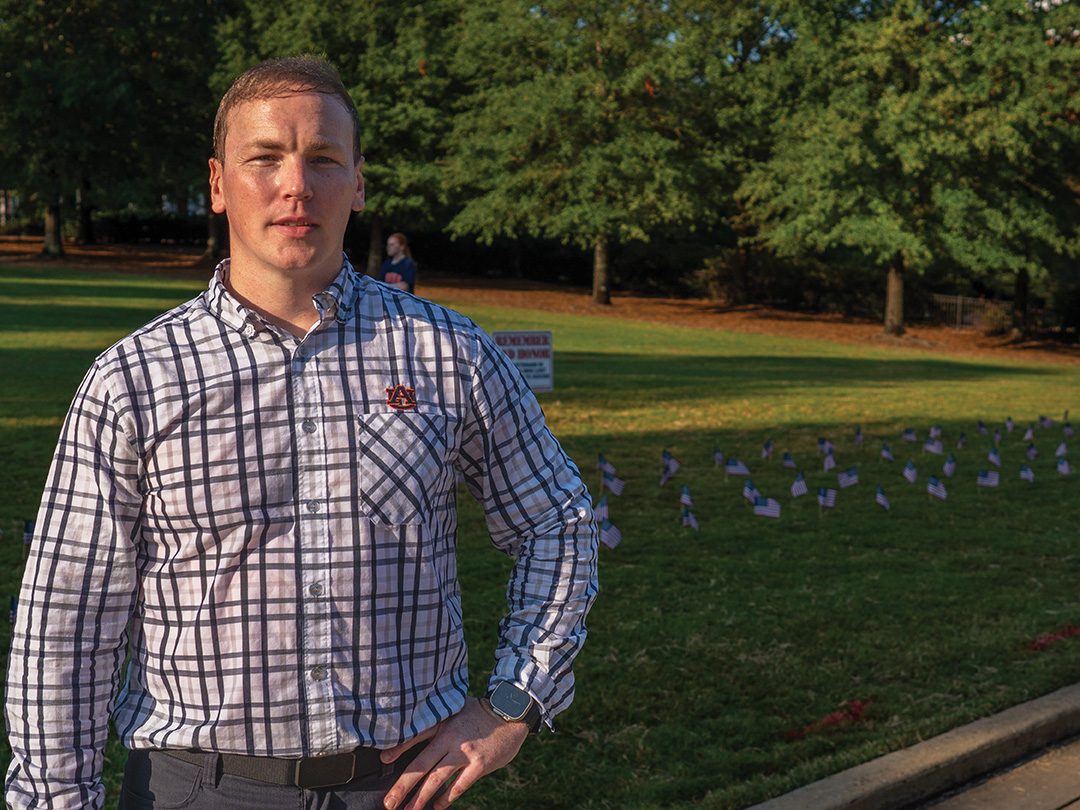
It’s the morning of Sept. 13. Curtis Pippin ’17, program coordinator for the Auburn Veterans Resource Center (AVRC), is speaking from his campus office. A day earlier he led a memorial on Cater Lawn for the 143 Alabama veterans who died by suicide in 2022, a solemn reminder that America’s soldiers aren’t always safe and sound after service.
Pippin would know. He did six years and nine months of active duty as a medic with the U.S. Army, performing admirably under pressure and recognized for overcoming tough challenges. Like many veterans, he assumed that his time in the military—the accomplishments, the training, the honors—would mean just as much in civilian life.
“But the bottom line is, it really may not,” said Pippin. “Everybody has a different experience. For me personally, I felt like I was starting over and I was being evaluated like I was coming out of high school again. That’s really difficult for a lot of veterans to digest, especially if you’ve been to combat and you’ve led soldiers. Now here you are, trying to apply for an entry-level job.”
It’s a story many veterans can relate to. Pippin applied to jobs while still in the Army with little success. When his wife, Kelly, took a position at Auburn, he decided to enroll and improve his odds. A first-generation college student, he earned a degree in psychology and graduated with honors, intending to help people—veterans, especially—like he had as a medic.
But the job search wasn’t any better, and things got bleak for a while. Self-doubt was common. Pippin calls it “survival mode,” doing what you can to keep going. He was working full time for the National Guard, constantly looking for opportunity, when he learned that Alabama’s Cooperative Extension Office had a veteran’s outreach position opening in St. Clair County. It was everything he wanted—except the commute. When a similar position opened at Auburn’s Veterans Resource Center last September, he took it.
As program coordinator, he focuses on making connections and building relationships. The former is easy, the latter a little more challenging. Relationships require a trust that takes time and difficult conversations to build. But having gone through the experience himself, he knows the questions that need to be asked.
“What can the university do, or what can the VRC do, to help you successfully navigate campus and pursue your academic and professional goals? We want to make sure that you’re successful, not only at Auburn, but also after you graduate. I wish someone had kind of done that for me, so that’s where my mindset is.”
“I might meet 50 veterans in a month, and maybe 5 or 10 of those are living in ‘survival mode.’ If there’s something I can do to help them out of that situation, or give them a hand up to a better place, man, it’s all worth it to me.”
In the past year the VRC has built programming around four primary veteran needs: academic services, veteran and family services, career services and disability services. With approximately 500 veterans on campus, no situation is identical, but Pippin is understanding how Auburn can help them all.
Campus events have included memorials to the fallen but also opportunities to celebrate their service and connect with the greater Auburn Family. The Auburn Student Veterans Association Gala, in particular, is always a fun night of camaraderie and fellowship. Pippin even plans to participate in the legendary “Iron Ruck” this year, where veterans from both Auburn and Alabama hike from one school to the other to deliver the game ball to the Iron Bowl. His role at Auburn has become as much a passion as a position.
But there are times when duty requires a personal touch.
Not long after taking the job, Pippin was contacted by a campus administrator who was concerned that a longtime Auburn employee and veteran was acting erratically. After visiting them with some faculty and a few fellow veterans, Pippin realized that decades of living alone had taken a toll on the individual. The Auburn team sprang into action, providing them additional assistance as well as giving their home a needed sprucing up.
“Helping veterans in need is really important to our identity,” said Pippin. “I might meet 50 veterans in a month, and maybe 5 or 10 of those are living in ‘survival mode.’ If there’s something I can do to help them out of that situation or give them a hand up to a better place, man, it’s all worth it to me. There’s no better feeling.”
To make a gift to Auburn’s Veterans Resource Center, click below.
Veterans Use Music To Provide Hope
Jason Howk ’00 sings for veterans struggling with life after the military
Man Gives for 65 Years
Auburn grad invests in his alma mater for more than 65 years
Auburn Rugby Club’s Rise to Greatness
For decades, Auburn’s Rugby Club fought for relevance as much as victory. Then they were national champions.
Building Hope: Disaster Relief Architecture & Design
Combining faith and design, disaster response architect Sarah Elizabeth Dunn ’03 builds shelters for disaster-stricken communities around the world.
Harold Franklin Reflects on Integration 50 Years Later
Fifty years ago, unsure of his safety, a tall, soft-spoken Black man walked alone across the Auburn campus to register for classes.
Auburn Love Stories: How They Met
From blind dates to football games to chance meetings in the classroom, Auburn alums reflect on how they found love and everlasting romance on the Plains.
